Related Research Articles

Carl Maria Friedrich Ernst von Weber was a German composer, conductor, virtuoso pianist, guitarist, and critic who was one of the first significant composers of the Romantic era. Best known for his operas, he was a crucial figure in the development of German Romantische Oper.

Bernd Heinrich Wilhelm von Kleist was a German poet, dramatist, novelist, short story writer and journalist. His best known works are the theatre plays Das Käthchen von Heilbronn, The Broken Jug, Amphitryon and Penthesilea, and the novellas Michael Kohlhaas and The Marquise of O. Kleist died by suicide together with a close female friend who was terminally ill.
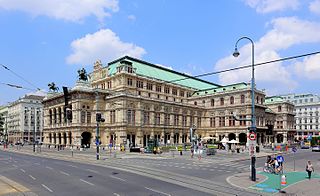
Opera in German is that of the German-speaking countries, which include Germany, Austria, and the historic German states that pre-date those countries.
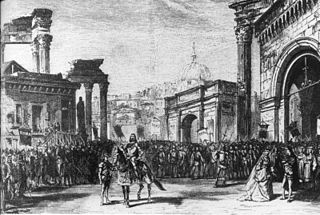
Rienzi, der letzte der Tribunen is an early opera by Richard Wagner in five acts, with the libretto written by the composer after Edward Bulwer-Lytton's novel of the same name (1835). The title is commonly shortened to Rienzi. Written between July 1838 and November 1840, it was first performed at the Königliches Hoftheater Dresden, on 20 October 1842, and was the composer's first success.

Othmar Schoeck was a Swiss Romantic classical composer, opera composer, musician, and conductor.

Werner Egk, born Werner Joseph Mayer, was a German composer.
Tannhäuser is an 1845 opera in three acts, with music and text by Richard Wagner. It is based on two German legends: Tannhäuser, the mythologized medieval German Minnesänger and poet, and the tale of the Wartburg Song Contest. The story centres on the struggle between sacred and profane love, as well as redemption through love, a theme running through most of Wagner's work.

Siegfried Matthus was a German composer, conductor, and festival founder and manager. Some of his operas, such as Judith, were premiered at the Komische Oper Berlin in East Berlin. In 1991, he founded the chamber opera festival Kammeroper Schloss Rheinsberg and directed it until 2018. In 2005, he composed a Te Deum for the reopening of the Dresden Frauenkirche. Matthus is considered one of Germany's most often performed contemporary composers.
Friedrich August Bungert was a German opera composer and poet.

Leo Blech was a German opera composer and conductor who is perhaps most famous for his work at the Königliches Opernhaus from 1906 to 1937, and later as the conductor of Berlin's Städtische Oper from 1949 to 1953. Blech was known for his reliable, clear, and elegant performances, especially of works by Wagner, Verdi, and Bizet's Carmen, and for his sensitivity as an accompanist.
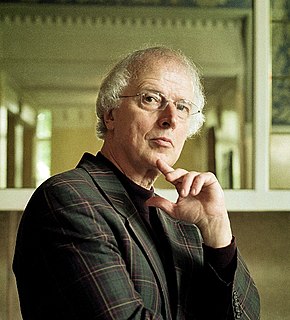
Udo Zimmermann was a German composer, musicologist, opera director, and conductor. He worked as a professor of composition, founded a centre for contemporary music in Dresden, and was director of the Leipzig Opera and the Deutsche Oper Berlin. He directed a contemporary music series for the Bayerischer Rundfunk and a European centre of the arts in Hellerau. His operas, especially Weiße Rose, on a topic he set to music twice, have been performed internationally, and recorded.
Fritz Geißler (or Geissler) was one of the most important composers of the German Democratic Republic.
Since the 18th century Berlin has been an influential musical center in Germany and Europe. First as an important trading city in the Hanseatic League, then as the capital of the electorate of Brandenburg and the Prussian Kingdom, later on as one of the biggest cities in Germany it fostered an influential music culture that remains vital until today. Berlin can be regarded as the breeding ground for the powerful choir movement that played such an important role in the broad socialization of music in Germany during the 19th century.
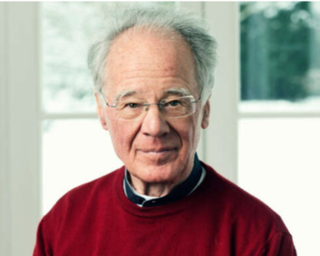
George Alexander Albrecht was a German conductor and composer, who also worked as a musicologist and academic teacher. A prolific composer at a young age, he was Generalmusikdirektor (GMD) of the Staatsoper Hannover from 1965 for 30 years, where he led not only the major operas by Mozart and stageworks by Wagner, but contemporary composers, such as Aribert Reimann's Troades in 1987. He was GMD of the Nationaltheater Weimar from 1996, and taught at the Hochschule für Musik Franz Liszt, Weimar. Albrecht promoted the works of neglected composers such as Wilhelm Furtwängler, Hans Pfitzner, and Erwin Schulhoff.

Rudolf Wagner-Régeny was a composer, conductor, and pianist. Born in Transylvania, Kingdom of Hungary, since 1920 Romania, he became a German citizen in 1930, and then East German after 1945.

Der Ring des Polykrates, Op. 7, is a one-act opera by Erich Wolfgang Korngold. The libretto, written by Leo Feld and reworked (unattributed) by the composer's father Julius Korngold, is based on a drama by Heinrich Teweles.

Moritz Ludwig Carl Ignaz Franz August Fürstenau was a German flautist and music historian. He left only a few works that gained little significance, but was extremely helpful as a theater historian.
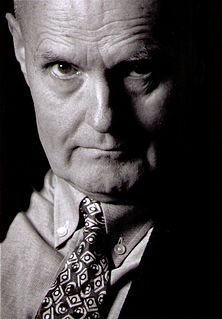
Fritz Hennenberg is a German musicologist and dramaturg.
Joachim Herz was a German Opera director and manager. He learned at the Komische Oper Berlin as an assistant to Walter Felsenstein. His major stations were the Leipzig Opera where he opened the new house with Wagner's Die Meistersinger von Nürnberg, Komische Oper and Semperoper in Dresden, where he opened the restored house with Weber's Der Freischütz in 1985. He staged many world premieres, and worked internationally. Herz was the first director to apply Felsenstein's concepts to Wagner's Der Ring des Nibelungen, staged in Leipzig from 1973 to 1976.
Joachim Werzlau was a German pianist, radio consultant and composer. He belonged to the first generation of composers in the GDR, where he was also active in organisations and politics. As a pianist, he played for the theatre, for Mary Wigman's dance school, and a kabarett, among others. He composed popular songs, music for audio plays, film scores, incidental music, and three operas. With films such as Nackt unter Wölfen and Jakob der Lügner, he was the most popular film composer of the GDR of his time.
References
- Mathias Henke: Das große Buch der Zupfmusik. Schwingestein-Verlag, p. 153
- Heinrich Vogel: Fried Walter. Verzeichnis seiner Kompositionen und Bearbeitungen. Eine Dokumentation. Fried-Walter-Archiv Heinrich Vogel, Remscheid, Weststr. 21, 1993